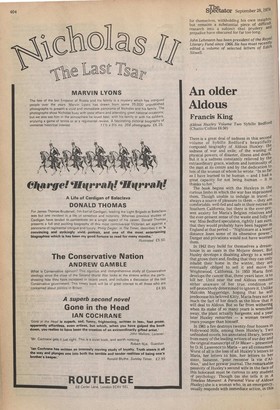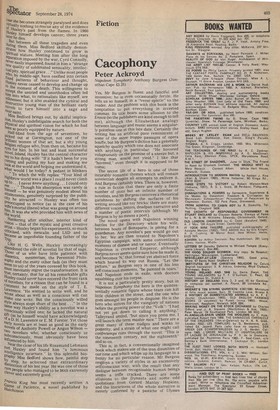An older Aldous
Francis King
.1dous Huxley Volume Two Sybille Bedford (Chatto/Collins £4.50)
There is a great deal of sadness in this second volume of Sybille Bedford's beautifully composed biography of Aldous Huxley: the sadness of war and exile; of the waning of physical powers; of disaster, illness and death. But it is a sadness constantly relieved by the, extraordinary grace, wisdom and luminosity or the man at its centre and by the dedication to him of the woman of whom he wrote: "In so far as I have learned to be human — and I had .tt great capacity for not being human — it Is thanks to her."
The book begins with the Huxleys in the curious limbo in which the war has imprisoned them. Thotigh unable to indulge in travel — always a source of pleasure to them — they are comfortable, well-fed and safe in their retreat m Southern California; but there is the ever-present anxiety for Maria's Belgian relatives and the ever-present sense of the waste and folly of war. Miss Bedford speculates, rightly I am sure, that they would probably have been happier in England at that period — "Nightmare at a lesser, distance loses some of its obsessive power. Danger and privations would not have worried them. In 1942 they build for themselves a dream" house in an oasis in the Mojave desert. But Huxley develops a disabling allergy to a weed that grows there and, finding that they can only inhabit their home in the winter, they are eventually obliged to sell it and move to Wrightwood, California. In 1953 Maria first develops the cancer that, three years later, is to kill her. Until near the end Aldous remains either unaware of her true condition or self-protectively determined to ignore it. Unlike Malcolm Muggeridge, hoping that he will predecease his beloved Kitty, Maria fears not so much the fact of her death as the blow that it will deal to Aldous. But so far from withering when its stake of so many years is wrenched away, the plant actually burgeons; and a year later Huxley remarries — a woman twenty years younger than himself. In 1961 a fire destroys twenty-four houses in Hollywood Hills, among them Huxley's. Two unfinished novels, his annotated library, letters from many of the leading writers of our day and the original manuscript of St Mawr — presented by D. H. Lawrence to Maria — are all consumed. Worst of all is the loss of all Huxley's letters to Maria, her letters to him, her letters to her sister, Suzanne, "pour reconter la vie d'Aldous," and her prewar journal. The remarkable passivity of Huxley's second wife in the face of this holocaust must be curious to any student of psychology. Though (as she tells it in A Timeless Moment: A Personal View of Aldous Huxley) she is a woman who, in an emergency, usually responds with immediate action, in this cv,se she becomes strangely paralysed and does
ni,rt„ from nothing to rescue any of the evidence rt `." oxley's past the flames. In 1960 Huxley himself develops cancer; three years later he dies.
But between all these tragedies and even s_uuring them, Miss Bedford skilfully demontrates how Huxley continued to grow in sPiritual stature. Meeting him after the long _seParation imposed by the war, Cyril Connolly, ...u"er easily impressed, found in him a "strange ',Lew quality of sublimated sensuality, intellectui_al pity, spiritual grace ..." Unlike most people Wr 110, by middle-age, have ossified into certain ed patterns of behaviour and thought, Huxley never ceased to develop and change up to the moment of death. This willingness to a, Ccept the untried and unorthodox often led tam into what, to rationalists like myself, are 91inesses; but it also enabled the cynical and aestructive young man of the brilliant early IlOvels to turn himself into a sage and near..saint. Miss Bedford brings out, by skilful implicaU,on, Huxley's indefatigable search for both the gaYsical and spiritual vision for which he had ae,,rlso poorly equipped by nature. tialf-blind from the age of seventeen, he picked out at Garsington, not one of the Orilliant women of that set, but a shy young kigian refugee who, from then on, became his eyes for him. In his last and least successful nwel, Island, Huxley has the central character saY to his dying wife: "If it hadn't been for you Foaling and pulling my hair and making me look at the world and helping me understand it, what would I be today? A pedant in blinkers ." To which the wife replies: "Your kind of lghbrow world was a place I could never climb :0... I never knew anything-... I Could only e • • ." Though his absorption was rarely in illroself — he was genuinely modest about his attainments, genuinely surprised by the publicitY he attracted — Huxley was often too Preoccupied to notice (as in the case of his Ihv.ife's mortal illness) what was going on around an. It was she who provided him with news of the world. Hankering after another, interior kind of ViSIOfl – that of the mystic and great creative 'tist – Huxley began his experiments, so much criticised, with mescalin and LSD and so i.,becarrie an improbable founding father of the trip.
Like H. G. Wells, Huxley increasingly abandoned the role of novelist for that of sage. Those of us who have little patience with netics, mesmerism, the Perennial Philo„s°PhY and the many other fads (as they must 'eetri to us) of the years covered by this book, ,n.11-lat inevitably regret the transformation. It is Lrlie, certainly, that for all his remarkable gifts "axleY could never have entered the front rank of novelists, for a reason that can be found in a ,coMment he made on the style of T. E. 1-awrence: "He wanted to write well, and he wrote about as well as a conscious will can Make one write. But the consciously willed Style always stops short of the best . . .” In the The way Huxley's ability as a novelist was a consciously willed one; he lacked the natural ngfift (as he himself would have acknowledged) DH. Lawrence or E. M. Forster. Yet those '41W novels are at least as good as the early ,huvels of Anthony Powell or Angus Wilson — 'Wo novelists who, whether consciously or sabconsciously, must obviously have been influenced by him. Near the close of his life Rosamund Lehmann tnet Huxley and found him "a luminous intelligence incarnate." In this splendid bioraPilY Miss Bedford shows how, painful step step, he achieved that extraordinary %Unction of his last year. He was one of those rare People who managed to be btth extremely clever and extremely good.
r,Francis King has most recently written A "arne of Patience, a novel published by Hutchinson



































 Previous page
Previous page